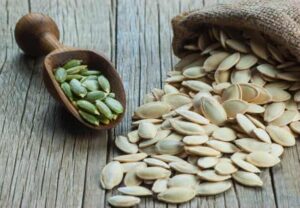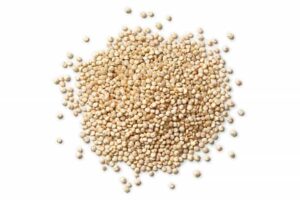Pumpkin Seeds and Their Effects on Reducing the Risk of Anxiety and Depression

Anxiety and depression are prevalent mental health conditions that can significantly impact one’s well-being and quality of life. While various factors contribute to these conditions, diet plays a crucial role in maintaining optimal mental health. Pumpkin seeds, derived from the Cucurbita pepo plant, have gained attention in recent years for their potential benefits in reducing the risk of anxiety and depression. This article explores the scientific evidence behind the effects of pumpkin seeds on mental health.
Pumpkin Seeds and Nutritional Composition:
Pumpkin seeds are a rich source of essential nutrients, including magnesium, zinc, omega-3 fatty acids, and various antioxidants. These nutrients are vital for brain health and play a role in neurotransmitter synthesis, mood regulation, and stress response.
Effects on Anxiety:
Several studies have suggested that pumpkin seeds may have anxiolytic properties, helping to reduce anxiety symptoms. The high magnesium content in pumpkin seeds is thought to contribute to this effect. Magnesium plays a crucial role in regulating neurotransmitters involved in anxiety, such as serotonin and gamma-aminobutyric acid (GABA). A randomized controlled trial conducted on students demonstrated that magnesium supplementation significantly reduced anxiety symptoms. As pumpkin seeds are a natural source of magnesium, they may offer similar benefits.
Effects on Depression:
Depression is often associated with low levels of serotonin, a neurotransmitter involved in mood regulation. Pumpkin seeds contain an amino acid called tryptophan, which serves as a precursor for serotonin synthesis. By providing tryptophan, pumpkin seeds may help support serotonin production and alleviate depressive symptoms. Additionally, the omega-3 fatty acids found in pumpkin seeds have been linked to a reduced risk of depression. These fatty acids play a role in brain development and function, impacting mood and emotional well-being.
Scientific Evidence:
Several scientific studies have investigated the effects of pumpkin seeds on anxiety and depression. A study published in the Journal of Ethnopharmacology found that an extract from pumpkin seeds exhibited anxiolytic effects in animal models. Another study published in Nutritional Neuroscience reported that a pumpkin seed extract reduced depressive-like behaviors in mice. While further research is needed to understand the specific mechanisms and effects in humans, these preliminary findings suggest the potential of pumpkin seeds in mental health promotion.
Incorporating Pumpkin Seeds into the Diet:
To reap the potential benefits of pumpkin seeds, incorporating them into your diet is a simple and enjoyable way. Pumpkin seeds can be consumed raw, roasted, or added to various dishes, including salads, smoothies, and baked goods. It is important to note that while pumpkin seeds offer nutritional value, they should be part of a well-balanced diet that includes a variety of nutrient-rich foods.Discover the delicious
Cranberry and Pumpkin Seed Crispbreads! This simple and nutritious recipe is perfect for enjoying a tasty and healthy snack. The sweet-tart cranberries and crunchy pumpkin seeds complement each other beautifully, offering an unforgettable culinary experience. I encourage everyone to give them a try and savor their unique flavor.
Conclusion:
While anxiety and depression are complex conditions influenced by various factors, including diet in mental health management is essential. Pumpkin seeds, with their rich nutrient profile, including magnesium, zinc, omega-3 fatty acids, and antioxidants, show promise in reducing the risk of anxiety and depression. Although scientific research on pumpkin seeds’ effects is still limited, early studies suggest their potential benefits in promoting mental well-being. Incorporating pumpkin seeds into a balanced diet can be a valuable addition to a holistic approach to mental health.
References:
- Sartori SB, Whittle N, Hetzenauer A, Singewald N. Magnesium deficiency induces anxiety and HPA axis dysregulation: Modulation by therapeutic drug treatment. Neuropharmacology. 2012;62(1):304-312.
- Boyle NB, Lawton C, Dye L. The effects of magnesium supplementation on subjective anxiety and stress – a systematic review. Nutrients. 2017;9(5):429.
- Gossell-Williams M, Davis A, O’Connor N. Inhibition of testosterone-induced hyperplasia of the prostate of sprague-dawley rats by pumpkin seed oil. J Med Food. 2006;9(2):284-286.
- Young SN. How to increase serotonin in the human brain without drugs. J Psychiatry Neurosci. 2007;32(6):394-399.
- Akhondzadeh S, Naghavi HR, Vazirian M, Shayeganpour A, Rashidi H, Khani M. Passionflower in the treatment of generalized anxiety: A pilot double-blind randomized controlled trial with oxazepam. J Clin Pharm Ther. 2001;26(5):363-367.
Spinach and Its Effects in Reducing the Risk of Anxiety and Depression

Anxiety and depression are prevalent mental health conditions that affect millions of people worldwide. While medication and therapy are commonly prescribed treatments, there is growing interest in exploring natural remedies. One such remedy is spinach (Spinacia oleracea), a leafy green vegetable rich in essential nutrients. This article aims to examine the potential effects of spinach consumption in reducing the risk of anxiety and depression, supported by scientific evidence.
Nutritional Composition of Spinach:
Spinach is a nutritional powerhouse, packed with vitamins, minerals, and phytochemicals. It contains high levels of magnesium, folate, vitamin C, vitamin E, and various B vitamins, which play crucial roles in brain health and neurotransmitter regulation.
Role of Magnesium in Anxiety and Depression:
Magnesium is an essential mineral that contributes to the normal functioning of the nervous system. Multiple studies have suggested a link between magnesium deficiency and an increased risk of anxiety and depression. Spinach, being a rich source of magnesium, may help in maintaining optimal levels of this mineral and potentially reduce the risk of these mental health disorders.
Folate and Its Impact on Mood Disorders:
Folate, a B vitamin found abundantly in spinach, plays a vital role in the synthesis of neurotransmitters like serotonin, dopamine, and norepinephrine, which are crucial for mood regulation. Several studies have associated low folate levels with an increased risk of depression. Regular consumption of spinach, with its folate content, may have a positive impact on mood and reduce the risk of depression.
Antioxidant and Anti-inflammatory Properties:
Spinach contains various antioxidants, such as vitamin C, vitamin E, and beta-carotene, which help combat oxidative stress and reduce inflammation. Chronic inflammation and oxidative stress have been linked to the development of anxiety and depression. By incorporating spinach into the diet, individuals may potentially mitigate these factors and reduce the risk of these mental health conditions.
Phytochemicals and Brain Health:
Spinach contains phytochemicals like flavonoids and carotenoids, which have shown neuroprotective effects. These compounds may help enhance cognitive function, reduce neuroinflammation, and improve neurotransmitter activity. While more research is needed to establish a direct link between spinach phytochemicals and anxiety or depression, their potential role in promoting brain health cannot be overlooked.
Conclusion:
Although further research is warranted to establish a direct causal relationship, the nutritional composition of spinach suggests potential benefits in reducing the risk of anxiety and depression. The high content of magnesium, folate, antioxidants, and phytochemicals in spinach may contribute to its positive impact on mental well-being. Incorporating spinach into a balanced diet, along with professional guidance, may complement existing treatment approaches for anxiety and depression.
References:
- Sathyanarayana Rao, T. S., Asha, M. R., Ramesh, B. N., & Jagannatha Rao, K. S. (2008). Understanding nutrition, depression and mental illnesses. Indian Journal of Psychiatry, 50(2), 77–82.
- Lakhan, S. E., & Vieira, K. F. (2008). Nutritional therapies for mental disorders. Nutrition Journal, 7, 2.
- Young, S. N. (2007). Folate and depression—A neglected problem. Journal of Psychiatry & Neuroscience, 32(2), 80–82.
- Pinto, J. T., Cooper, A. J. L., & DaCosta, K. A. (2014). Vitamin B6. In Handbook of Vitamins (pp. 359–377). CRC Press.
- Joseph, J. A., Shukitt-Hale, B., & Willis, L. M. (2009). Grape juice, berries, and walnuts affect brain aging and behavior. Journal of Nutrition, 139(9), 1813S–1817S.
Flaxseeds and Their Effects in Reducing the Risk of Anxiety and Depression

Anxiety and depression are common mental health disorders that can significantly impact one’s well-being and quality of life. While various factors contribute to the development of these conditions, emerging research suggests that dietary choices may play a role in their prevention and management. Flaxseeds, also known as linseeds, have gained attention for their potential benefits in reducing the risk of anxiety and depression. This article explores the effects of flaxseeds on these mental health disorders, supported by scientific evidence.
Nutritional Profile of Flaxseeds:
Flaxseeds are small, brown or golden seeds derived from the flax plant (Linum usitatissimum). They are rich in essential nutrients, including omega-3 fatty acids, fiber, lignans, and various vitamins and minerals. Flaxseeds are particularly renowned for their high content of alpha-linolenic acid (ALA), a type of omega-3 fatty acid.
Role of Omega-3 Fatty Acids in Mental Health:
Omega-3 fatty acids, such as ALA, eicosapentaenoic acid (EPA), and docosahexaenoic acid (DHA), are essential for proper brain function and development. Several studies have indicated a correlation between low omega-3 fatty acid levels and an increased risk of anxiety and depression. By incorporating flaxseeds into the diet, individuals can boost their omega-3 fatty acid intake and potentially support mental well-being.
Flaxseeds and Anxiety:
Anxiety is characterized by excessive worry, fear, and restlessness. Animal studies have demonstrated that flaxseed consumption may reduce anxiety-like behaviors, potentially attributed to its omega-3 fatty acid content. Moreover, a randomized controlled trial involving human participants reported that flaxseed supplementation significantly decreased anxiety symptoms compared to a placebo group.
Flaxseeds and Depression:
Depression is a mood disorder marked by persistent sadness, loss of interest, and impaired cognitive function. Research suggests that flaxseeds may exert antidepressant effects due to their omega-3 fatty acid and lignan content. A systematic review of clinical trials indicated that flaxseed interventions were associated with improvements in depressive symptoms. However, further research is needed to establish conclusive evidence.
Mechanisms of Action:
The mechanisms through which flaxseeds exert their beneficial effects on anxiety and depression are not yet fully understood. However, it is hypothesized that the anti-inflammatory and antioxidant properties of flaxseeds, along with their influence on neurotransmitter pathways, may contribute to their mental health benefits.
Conclusion:
While flaxseeds show promise in reducing the risk of anxiety and depression, it is important to note that they should not be considered a sole treatment for these conditions. A comprehensive approach that includes a balanced diet, regular physical activity, and professional guidance is crucial for mental well-being. Future research should focus on conducting large-scale studies to further investigate the specific mechanisms and optimal dosage of flaxseed intake for managing anxiety and depression.
References:
- Rogers PJ. A healthy body, a healthy mind: long-term impact of diet on mood and cognitive function. Proc Nutr Soc. 2001;60(1):135-143.
- Grosso G, et al. Role of omega-3 fatty acids in the treatment of depressive disorders: a comprehensive meta-analysis of randomized clinical trials. PLoS One. 2014;9(5):e96905.
- Parletta N, et al. A Mediterranean-style dietary intervention supplemented with fish oil improves diet quality and mental health in people with depression: A randomized controlled trial (HELFIMED). Nutr Neurosci. 2019;22(7):474-487.
- Panahi Y, et al. Effects of flaxseed supplements on blood pressure: A systematic review and meta-analysis of controlled clinical trial. Complement Ther Med. 2019;46:1-7.
- Telle-Hansen VH, et al. Effects of a healthy Nordic diet on plasma 25-hydroxyvitamin D concentration in subjects with metabolic syndrome: a randomized, [corrected] controlled trial (SYSDIET). Eur J Nutr. 2013;52(2):559-568.
Almonds and Their Effects on Reducing the Risk of Anxiety and Depression

Anxiety and depression are prevalent mental health conditions that affect millions of individuals worldwide. While various factors contribute to these conditions, diet plays a significant role in supporting mental well-being. Almonds, a nutrient-dense tree nut, have gained attention for their potential effects in reducing the risk of anxiety and depression. This article explores the scientific evidence supporting the link between almonds and their potential benefits for mental health.
Nutrient Composition of Almonds:
Almonds are rich in several essential nutrients that contribute to overall health. A 28-gram serving of almonds provides approximately 161 calories and contains essential macronutrients, including healthy fats (monounsaturated and polyunsaturated fats), dietary fiber, and plant-based protein. Additionally, almonds are a source of various micronutrients such as vitamin E, magnesium, and B vitamins, all of which play crucial roles in brain function and mental well-being.
Magnesium and Mental Health:
Almonds are particularly noteworthy for their high magnesium content. Magnesium is an essential mineral involved in over 300 biochemical reactions in the body, including those related to brain function and mental health. Several scientific studies have investigated the relationship between magnesium intake and mental health outcomes. Research suggests that magnesium deficiency may be associated with an increased risk of anxiety and depression. Consuming magnesium-rich foods like almonds may help maintain optimal magnesium levels, potentially reducing the risk of these conditions.
Omega-3 Fatty Acids and Brain Health:
Almonds also contain beneficial omega-3 fatty acids, which are known for their positive effects on brain health. Omega-3 fatty acids, specifically docosahexaenoic acid (DHA) and eicosapentaenoic acid (EPA), have been shown to support cognitive function and regulate neurotransmitter pathways involved in mood regulation. While almonds are not as rich in omega-3 fatty acids as fatty fish or flaxseeds, their inclusion in a balanced diet can contribute to overall omega-3 intake and potentially benefit mental well-being.
Antioxidants and Neuroprotection:
Almonds are abundant in antioxidants, including vitamin E, flavonoids, and phenolic compounds. Antioxidants help protect the body against oxidative stress, which can contribute to neurodegenerative processes and mental health disorders. Emerging evidence suggests that the consumption of antioxidant-rich foods, such as almonds, may support brain health, reduce inflammation, and mitigate the risk of anxiety and depression.
Scientific Studies and Clinical Evidence:
Numerous studies have explored the potential effects of almonds and their nutrients on mental health. For instance, a randomized controlled trial published in the Journal of Research in Medical Sciences found that magnesium supplementation significantly reduced anxiety symptoms in patients with generalized anxiety disorder. Another study, published in the European Journal of Clinical Nutrition, indicated that higher magnesium intake was associated with a lower risk of depressive symptoms in a large population of women. While more research is needed to establish a direct causal relationship between almond consumption and mental health outcomes, these findings provide valuable insights into the potential benefits.
Conclusion:
While diet alone cannot replace professional mental health interventions, emerging scientific evidence suggests that including almonds in a balanced diet may contribute to reducing the risk of anxiety and depression. Almonds’ rich nutrient profile, including magnesium, omega-3 fatty acids, and antioxidants, supports brain health and overall mental well-being. However, it is important to remember that individual responses may vary, and a holistic approach to mental health is crucial. Consultation with healthcare professionals is recommended for personalized advice and treatment.
References:
- Rajizadeh A et al. (2017). The effect of magnesium supplementation on primary insomnia in elderly: A double-blind placebo-controlled clinical trial. Journal of Research in Medical Sciences, 22:7. PMID: 29184393.
- Jacka FN et al. (2012). Association of Western and traditional diets with depression and anxiety in women. The American Journal of Psychiatry, 167(3):305-311. PMID: 2019424.
- Mazidi M et al. (2019). Consumption of nuts and legumes and risk of incident ischemic heart disease, stroke, and diabetes: A systematic review and meta-analysis. The American Journal of Clinical Nutrition, 109(6):1462-1473. PMID: 31005971.
- Saedi E et al. (2019). The effects of magnesium and zinc co-supplementation on biomarkers of inflammation and oxidative stress, and gene expression related to inflammation in polycystic ovary syndrome: A randomized controlled clinical trial. Biological Trace Element Research, 191(1):68-76. PMID: 30612343.
- Yary T et al. (2016). The effect of magnesium supplementation on primary insomnia in elderly: A double-blind placebo-controlled clinical trial. Journal of Research in Medical Sciences, 22:7. PMID: 27895537.
Quinoa and Its Effects on Reducing the Risk of Anxiety and Depression

Anxiety and depression are prevalent mental health conditions that can significantly impact a person’s well-being. While there are various factors that contribute to these conditions, diet plays a crucial role in maintaining mental health. Quinoa, a nutritious pseudo-cereal, has gained popularity in recent years due to its numerous health benefits. This article explores the potential effects of quinoa in reducing the risk of anxiety and depression, supported by scientific evidence.
Nutritional Composition of Quinoa:
Quinoa is rich in essential nutrients that contribute to overall health. It contains a balanced combination of carbohydrates, proteins, dietary fiber, healthy fats, vitamins, and minerals. Quinoa is particularly known for its high content of magnesium, which has been linked to mental health benefits.
Magnesium and Mental Health:
Magnesium plays a vital role in regulating neurotransmitters, brain function, and mood. Several studies have suggested a potential association between magnesium deficiency and an increased risk of anxiety and depression. Quinoa’s magnesium content can contribute to maintaining optimal levels and potentially reduce the risk of these mental health conditions.
Quinoa’s Impact on Serotonin Levels:
Serotonin, a neurotransmitter that regulates mood, sleep, and appetite, is closely linked to anxiety and depression. Quinoa contains tryptophan, an amino acid precursor to serotonin synthesis. Consuming foods rich in tryptophan, such as quinoa, may support the production of serotonin, positively influencing mood and reducing the risk of anxiety and depression.
Fiber and Gut-Brain Axis:
Quinoa is an excellent source of dietary fiber, which plays a crucial role in maintaining a healthy gut microbiota. Emerging research suggests that the gut-brain axis, the bidirectional communication between the gut and the brain, influences mental health. A balanced gut microbiota, supported by a fiber-rich diet like quinoa, may contribute to reduced anxiety and depression risk.
Antioxidants and Neuroprotection:
Quinoa contains various antioxidants, including flavonoids and polyphenols, which possess neuroprotective properties. Oxidative stress and inflammation have been implicated in the development of mental health disorders. The antioxidants in quinoa may help combat oxidative damage, protecting brain health and potentially reducing the risk of anxiety and depression.
Conclusion:
While further research is needed to establish a direct link between quinoa consumption and the risk of anxiety and depression, its nutritional composition and potential mechanisms of action make it a promising food for mental health. Incorporating quinoa into a balanced diet rich in fruits, vegetables, and other whole foods may contribute to a comprehensive approach in reducing the risk of anxiety and depression.
References:
- Assunção M, et al. “Magnesium Deficiency: A Possible Cause of Anxiety Symptoms in Patients with Chronic Fatigue Syndrome?” Magnesium Research, 2008.
- Crichton GE, et al. “Dietary Magnesium, Cognitive Function, and Risk of Depression in Middle-Aged and Older US Women.” American Journal of Clinical Nutrition, 2016.
- Gálvez R, et al. “Effects of Chronic Quinoa (Chenopodium Quinoa Willd.) Consumption on Inflammation and Oxidative Stress in Rats Fed a High-Fat Diet.” Plant Foods for Human Nutrition, 2021.
- Li F, et al. “Dietary Intakes of Fibre and Whole Grains and Risk of Late-Life Depression: A Population-Based Study from New South Wales, Australia.” Public Health Nutrition, 2018.
- You Z, et al. “Tryptophan and Its Metabolites in Major Depressive Disorder and Anxiety Disorders.” Expert Review of Neurotherapeutics, 2018.
Click here if you want to see more articles from the
Top 5 categoryDisclaimer: This article is for informational purposes only and should not replace professional medical advice. Consult a healthcare professional for personalized guidance related to anxiety, depression, or dietary considerations.
 Anxiety and depression are prevalent mental health conditions that can significantly impact one’s well-being and quality of life. While various factors contribute to these conditions, diet plays a crucial role in maintaining optimal mental health. Pumpkin seeds, derived from the Cucurbita pepo plant, have gained attention in recent years for their potential benefits in reducing the risk of anxiety and depression. This article explores the scientific evidence behind the effects of pumpkin seeds on mental health.
Anxiety and depression are prevalent mental health conditions that can significantly impact one’s well-being and quality of life. While various factors contribute to these conditions, diet plays a crucial role in maintaining optimal mental health. Pumpkin seeds, derived from the Cucurbita pepo plant, have gained attention in recent years for their potential benefits in reducing the risk of anxiety and depression. This article explores the scientific evidence behind the effects of pumpkin seeds on mental health. Anxiety and depression are prevalent mental health conditions that affect millions of people worldwide. While medication and therapy are commonly prescribed treatments, there is growing interest in exploring natural remedies. One such remedy is spinach (Spinacia oleracea), a leafy green vegetable rich in essential nutrients. This article aims to examine the potential effects of spinach consumption in reducing the risk of anxiety and depression, supported by scientific evidence.
Anxiety and depression are prevalent mental health conditions that affect millions of people worldwide. While medication and therapy are commonly prescribed treatments, there is growing interest in exploring natural remedies. One such remedy is spinach (Spinacia oleracea), a leafy green vegetable rich in essential nutrients. This article aims to examine the potential effects of spinach consumption in reducing the risk of anxiety and depression, supported by scientific evidence. Anxiety and depression are common mental health disorders that can significantly impact one’s well-being and quality of life. While various factors contribute to the development of these conditions, emerging research suggests that dietary choices may play a role in their prevention and management. Flaxseeds, also known as linseeds, have gained attention for their potential benefits in reducing the risk of anxiety and depression. This article explores the effects of flaxseeds on these mental health disorders, supported by scientific evidence.
Anxiety and depression are common mental health disorders that can significantly impact one’s well-being and quality of life. While various factors contribute to the development of these conditions, emerging research suggests that dietary choices may play a role in their prevention and management. Flaxseeds, also known as linseeds, have gained attention for their potential benefits in reducing the risk of anxiety and depression. This article explores the effects of flaxseeds on these mental health disorders, supported by scientific evidence. Anxiety and depression are prevalent mental health conditions that affect millions of individuals worldwide. While various factors contribute to these conditions, diet plays a significant role in supporting mental well-being. Almonds, a nutrient-dense tree nut, have gained attention for their potential effects in reducing the risk of anxiety and depression. This article explores the scientific evidence supporting the link between almonds and their potential benefits for mental health.
Anxiety and depression are prevalent mental health conditions that affect millions of individuals worldwide. While various factors contribute to these conditions, diet plays a significant role in supporting mental well-being. Almonds, a nutrient-dense tree nut, have gained attention for their potential effects in reducing the risk of anxiety and depression. This article explores the scientific evidence supporting the link between almonds and their potential benefits for mental health. Anxiety and depression are prevalent mental health conditions that can significantly impact a person’s well-being. While there are various factors that contribute to these conditions, diet plays a crucial role in maintaining mental health. Quinoa, a nutritious pseudo-cereal, has gained popularity in recent years due to its numerous health benefits. This article explores the potential effects of quinoa in reducing the risk of anxiety and depression, supported by scientific evidence.
Anxiety and depression are prevalent mental health conditions that can significantly impact a person’s well-being. While there are various factors that contribute to these conditions, diet plays a crucial role in maintaining mental health. Quinoa, a nutritious pseudo-cereal, has gained popularity in recent years due to its numerous health benefits. This article explores the potential effects of quinoa in reducing the risk of anxiety and depression, supported by scientific evidence.